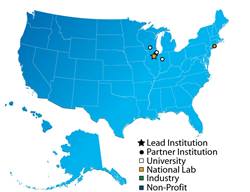IACT

Director(s):
Lead Institution:
Years:
2009-2014
Mission:
Research Topics:
catalysis (homogeneous), catalysis (heterogeneous), biofuels (including algae and biomass), bio-inspired, materials and chemistry by design, synthesis (novel materials), synthesis (scalable processing)
Materials Studied:
Experimental and Theoretical Methods:
X-ray diffraction and scattering, X-ray spectroscopy, electron microscopy, scanning probe microscopy, surface science, laser diagnostics, molecular dynamics (MD), density functional theory (DFT), monte carlo (MC), quantum mechanics, multiscale modeling, next generation optimization methods, high-throughput screening methods

Partner Institutions:
- Argonne National Laboratory
- Brookhaven National Laboratory
- Northwestern University
- Purdue University
- University of Wisconsin at Madison










